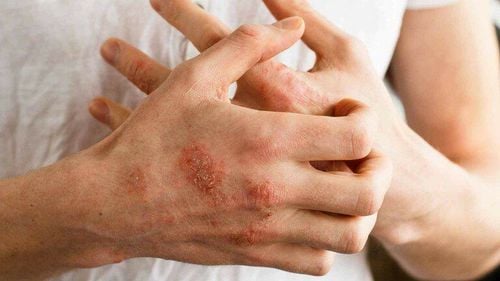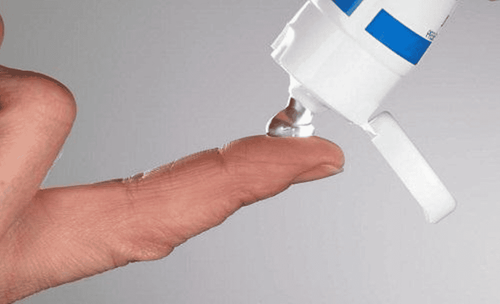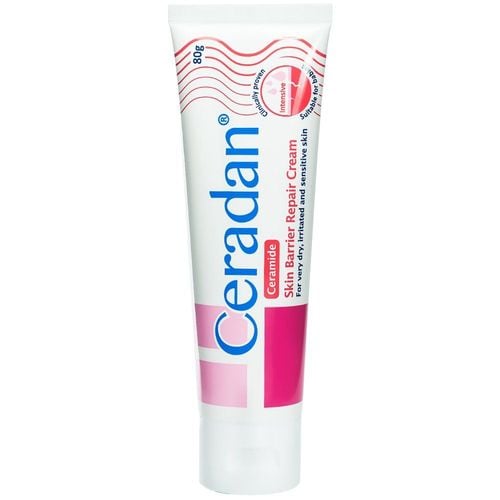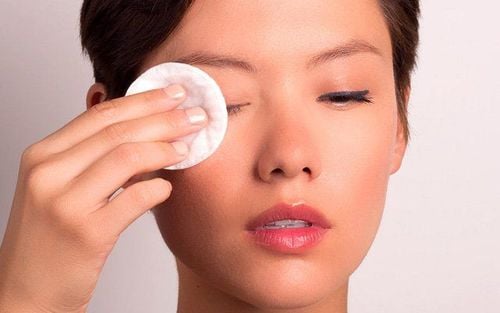This is an automatically translated article.
Dry facial skin can be a condition you face every day. Dry skin can be aggravated if the condition persists and is accompanied by an infection. To treat this condition, it is necessary to find out where the cause of dry skin is. This article helps you understand more about the causes of dry facial skin.1. Can dry skin cause other symptoms?
If your facial skin is dry, it may be flaky or itchy. At times, it may feel tight to the touch or even painful.Other symptoms of dry skin include:
Scars Flaking skin Redness Gray spots (for people with darker complexions) Rough or sandpaper-like skin Bleeding Dry skin can often be treated by adjusting your skin care routine or changing certain environmental factors. Sometimes dry skin is a sign of an underlying medical condition that needs to be treated by a doctor.
2. How can I get rid of dry skin on my face?
Before you start switching products, there are a few ways you can try to ease dry skin. Most are simple to take and can be used together to ease your symptoms.2.1. Avoid hot showers If possible, skip hot showers and switch to warm baths. Hot water can dry out your skin by removing its natural oils.
You may also find it beneficial to reduce time in the shower to 5 to 10 minutes. This helps avoid unnecessary exposure to water, which can leave your skin drier than it was before you jumped in the shower.
Avoid showering or bathing more than once a day, as this can aggravate dry skin.
2.2. Wash your face gently When choosing a cleanser, you should avoid soaps and cleansers that contain harsh ingredients like alcohol, retinoids, or alpha hydroxy acids. These unnecessary ingredients can dry out your skin and cause irritation or inflammation.

Bạn nên tránh các sản phẩm có chất tẩy rửa mạnh khi da bị khô
You should look for one or more of the following ingredients that are moisturizing:
Polyethylene glycol Akyl-polyglycoside Silicone surfactant Lanolin Paraffin Syndets, or synthetic cleaning agent, is another beneficial soap ingredient. They often contain chemicals like sulfur trioxide, sulfuric acid, and ethylene oxide, which are gentle on sensitive skin.
You should also be gentle when applying soap or cleanser to your face. Use only your fingertips and gently rub over your face instead of using a more abrasive sponge or washcloth. Do not rub the skin on your face as this may cause irritation.
Avoid washing your face several times a day. If you are facing dry skin, it is best to wash your face only at night. This cleans your face after a long day of collecting dirt and will prevent you from dumping the necessary amount of oil on your skin.
Do not exfoliate daily. Instead, try just once a week. This can reduce irritation from vigorous rubbing.
2.2. Apply moisturizer Find a moisturizer that works for your skin and use it often, especially after you shower. Applying it at this point can help your skin retain moisture.
Your facial moisturizer should be free of fragrance and alcohol, as they can cause unnecessary irritation. You may want to try a moisturizer that includes sunscreen to protect yourself from sun exposure. Look for products that help retain water in the skin.
To restore moisture, choose a heavier, oil-based moisturizer that contains ingredients that help keep skin hydrated. Petrolatum-based products are best for dry or chapped skin. They are more effective than creams and are more effective at preventing water from evaporating from your skin.
Lip balm can help relieve dry, chapped or cracked lips. Lip balm should contain gasoline, mineral oil or mineral oil. Make sure you feel comfortable when you apply it and don't make your lips itch. If so, try another product.

Kem dưỡng ẩm là sản phẩm cần thiết nếu bạn có làn da khô
Avoid rough, easy-to-scratch fabrics. Detergents must be hypoallergenic and free of dyes and fragrances. You may find cleansers formulated for sensitive skin beneficial.
2.4. Try a humidifier Low humidity can be a factor in drying out your skin. Use a humidifier in a room where you spend a lot of time. Adding moisture to the air can keep your skin from drying out. Make sure your humidifier is easy to clean, this can avoid bacteria buildup.
3. What causes dry skin?
Dry skin occurs when your skin doesn't have enough water or oil. Dry skin can affect anyone at any time. You can experience dry skin year-round or just during the cold months, when temperatures drop and humidity is low.You can also notice dry skin when:
Traveling Residing in dry climates You are exposed to chlorine in swimming pools You are exposed to too much sun Dry skin can be so severe that it cracks your skin . Cracked skin can allow bacteria to enter the body, causing infection. If you suspect you have an infection, you should consult your doctor.
Symptoms of infection include:
Red Heat Pus blisters Rash Pustules Fever
4. When do you go to the doctor?
Trying these basic treatments for dry skin on your face first should ease your symptoms.Contact your doctor if you:
Dry skin persists despite regular skin care Suspect that you have a skin infection Suspect that you may have another, more serious skin condition Conditions that appear to be mild dry skin at first but require more intensive medical treatment include:
Atopic dermatitis or eczema, which causes very dry skin on the face and other parts of the body. It is supposed to be inherited. Seborrheic dermatitis affects areas with oil glands, such as the eyebrows and nose. Psoriasis is a chronic skin condition that includes scaling, dry patches of skin, and other symptoms. Your doctor may recommend a prescription treatment for your dry skin. These treatments may include topical creams such as corticosteroids or oral medications, such as immunomodulators. Your doctor will likely recommend these medications in conjunction with routine skin care.
Changing your bathing routine or tweaking your skin care regimen should help relieve your symptoms within a week or so. To see permanent change, be consistent in these lifestyle changes. Sticking to a regular routine is the only way to guarantee lasting results.
If your symptoms persist or worsen, consult your doctor. In some cases, dryness can be a sign of an underlying skin condition. Your doctor or dermatologist can work with you to find the cause of any dry skin and come up with a treatment plan.

Hãy liên hệ với bác sĩ nếu tình trạng da khô tiếp diễn dù đã chăm sóc thường xuyên
5. How to prevent dry skin
To prevent future dryness, follow a healthy skin care routine.Wash your face daily with a mild cleanser and warm water. Choose the right skin care products for your skin type - oily, dry or combination skin. Protect your skin by applying a broad-spectrum sunscreen with SPF 30 or higher. Apply lotion after showering to lock in moisture. Use kerosene to moisturize dry skin. If you experience dry skin at a particular time of year, such as when the weather turns colder, be sure to adjust your skin care routine. It may be necessary to change your shower products or routine during certain times of the year to avoid drying out your face.
Please dial HOTLINE for more information or register for an appointment HERE. Download MyVinmec app to make appointments faster and to manage your bookings easily.
Reference source: healthline.com












